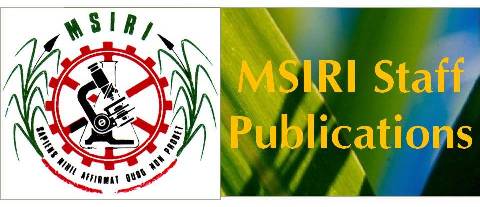Revisiting the practice of extention to meet the needs of the small-scale sugar cane farmers in Mauritius
| MSI11P4573 | |
| Payandi Pillay, K Ng Kee Kwong, K F | |
| Revisiting the practice of extention to meet the needs of the small-scale sugar cane farmers in Mauritius | |
| Program and Abstracts, ISSCT Management Commission Workshop: Effective research analysis and technology transfer using a multidisciplinary approach, 24-27 August 2011, Mamallapuram, India | |
| ISSCT Management Commission Workshop: Effective research analysis and technology transfer using a multidisciplinary approach, 24-27 August 2011, Mamallapuram, India | |
| book chapter | |
| 2011 | |
| [p. 1] | |
| Abstract only | |
| EN | |
| En | |
| In an era where the sugar cane industry is triving to be more competitive to survive and especially with the 36 per cent reduction in the price of sugar, existing farming operations should give way to more efficient ones to attain the twin objectives of reducing production costs and improving sugar cane yield per unit area. From this perspective of maintaining the long-term viability and sustainability of the sugar cane industry, it is imperative for organizations providing extension and advice to small-scale sugar cane farmers to revisit their approach in reaching the neediest. In this context, the Mauritius Sugar Industry Research Institute and the Farmers Service Corporation in Mauritius have over the years been promoting improved practices and techniques through such activities as field visits, on-farm trials and demonstrations, and group meetings. Numerous projects have, in addition, been implemented to increase cane and sugar productivity. More recently, a study has been conducted among small-scale sugarcane farmers to establish their socio-economic profile and their perception of the practice of extension and the provision of advisory services. They form an ageing population, with 47.8 per cent aged between 41 and 60 years and 41 per cent above 60 years old. Nearly 70 per cent of the farmers had received at least a full primary education and 46 per cent did not consult anybody for assistance in their cane and husbandry decisions. Only 9 per cent of the farmers received regular visits, at least once every month, from Extension Officers and among those receiving the visits of Extension Officers, about 35 per cent did not rely on the assistance provided. Extension officers are in consequence now in a better position to identify the shortcomings of their current approach towards the small-scale farmers. They had eventually seen their practice of extension to be more as a learning process rather than being an interface between research and the farmers, firmly believing that only new technology could ensure the survival of the small-scale farmers. | |
| farmers sugarcane farmers small-scale sugarcane farmers small farmers extension good management practice productivity agricultural extension sugarcane | |
| Mauritius | |
| Sugarcane: Farming systems research | |
| Extension | |
| 2011-09-12 | |
| EN | |
| LIB | |
| CAT | |
| 1 | |
| EXTN |
